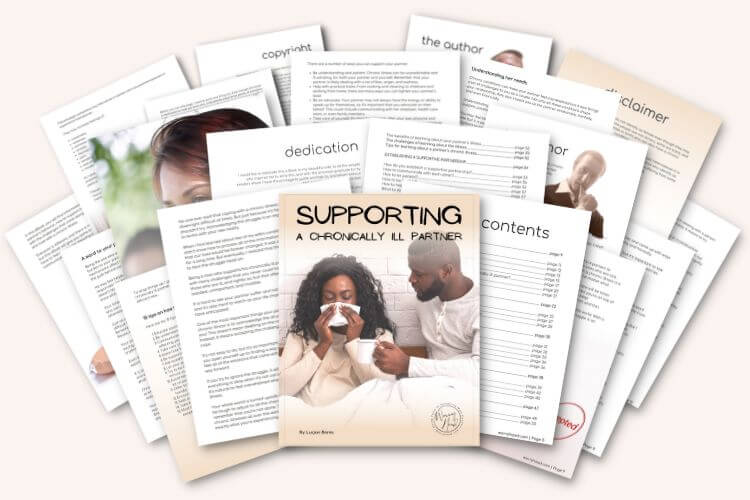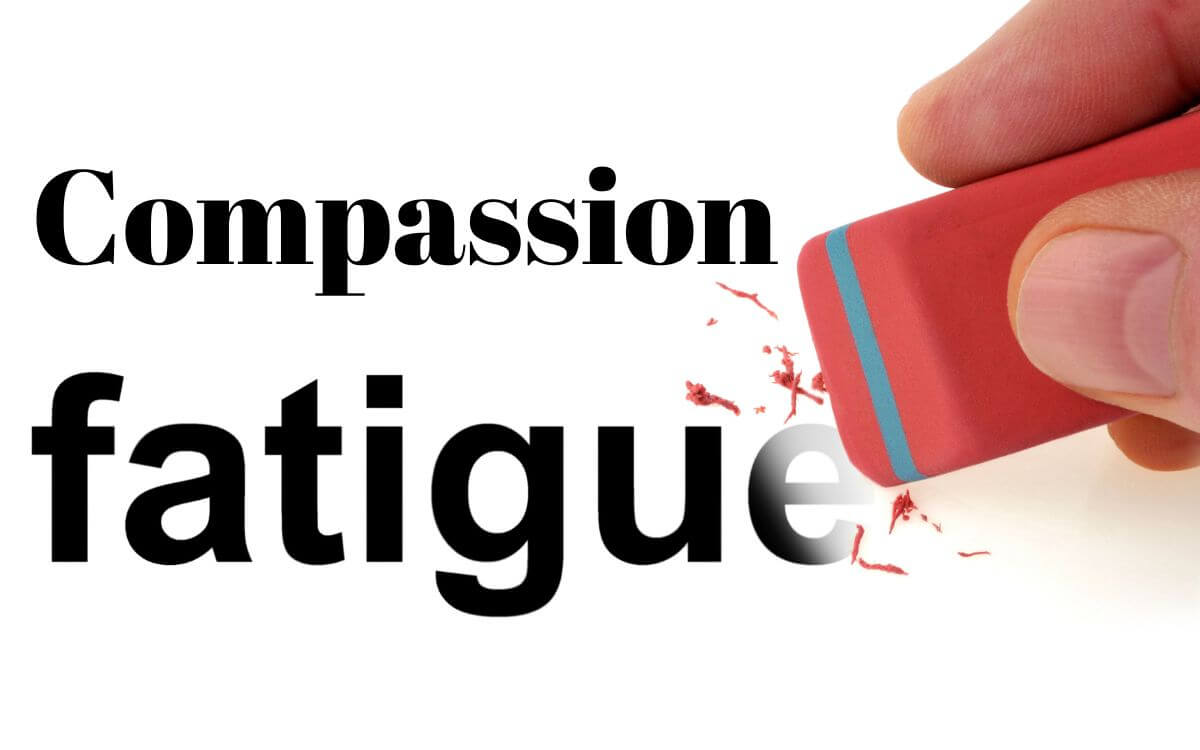What causes your partner compassion fatigue?
To answer what causes your partner compassion fatigue, we must first understand what compassion fatigue is.
Because compassion fatigue can lead to a number of problems, including depression, anxiety, and isolation, it’s important to be aware of the symptoms and causes so you can prevent them. But first, I explain what compassion fatigue is…
What is compassion fatigue?
Compassion fatigue is a state of physical, emotional, and mental exhaustion that can be caused by caring for someone who is chronically ill or injured. It’s caused by feeling compassion for others. It is the negative cost of caring.
I’ve been with my wife for 13 years, married to her for 10. When I experienced sharing her struggles with endometriosis and fibromyalgia, most of the time I felt alone. It could be what I now understand as compassion fatigue… but was it?
It wasn’t caregiver burnout. But what is caregiver burnout?
What is caregiver burnout?
Caregiver burnout occurs when the demands of caring for a chronically ill or disabled loved one exceed the caregiver’s physical, emotional, and financial resources. It’s different from compassion fatigue in that it is not caused by feeling compassion for others. It’s caused by the actual act of caregiving.
The symptoms of caregiver burnout.
- physical exhaustion
- emotional detachment
- apathy
- depression
- anxiety
- irritability
- anger
So let’s go back to compassion fatigue. In order to understand what causes your partner compassion fatigue, you need to know the symptoms.
What are the symptoms of compassion fatigue?
There can be many symptoms of compassion fatigue but what’s important is that it can affect every aspect of your life.
In order to minimize the possibility of having compassion fatigue, you should learn how to cope with your partner’s chronic illness, to help you with that, I give away a FREE Chapter of my eBook: “Supporting a Chronically Ill Partner”.
This chapter alone has all the comprehensive information about acknowledging the struggles, including:
- A word to your partner.
- A word to you.
- Stepping on eggshells.
- Understanding her needs.
- How to acknowledge having a chronically ill partner?
- Acknowledging can be hard.
- 15 tips on how to do it!
Get the 1st Chapter FREE!
Chronic Illness for Partners

The physical symptoms.
The physical symptoms of compassion fatigue are:
- chronic fatigue
- insomnia
- weight loss or gain
- headaches
- gastrointestinal problems
The emotional symptoms.
The emotional symptoms of compassion fatigue are:
- feeling overwhelmed
- feeling hopelessness
- constant worry
- irritability
- mood swings
- depression
- anxiety
The mental symptoms.
The mental symptoms of compassion fatigue are:
- difficulty concentrating
- memory problems
- confusion
What causes compassion fatigue?
There is no single cause of compassion fatigue. It can be caused by a variety of factors, such as:
- caring for someone who is chronically ill or injured
- witnessing trauma
- working in a helping profession
- having a personal history of trauma
How can you prevent compassion fatigue?
There is no single way to prevent compassion fatigue. However, there are some things that can help, such as:
- taking breaks
- asking for help
- eating a healthy diet
- exercising regularly
- meditating or doing yoga
- getting enough sleep

Chronic illness and compassion.
Compassion is important when you care for a chronically ill person. When you are compassionate, you can understand what the other person is feeling and going through. You can be there for them emotionally and physically.
Compassion is what allows us to put ourselves in another person’s shoes and feel what they are feeling. It’s the ability to empathize with another person. Compassion is an important emotion but it’s not always easy to feel. When you are constantly giving of yourself, it can be easy to become overwhelmed and start to feel compassion fatigue.
In this article, I wanted to focus on chronic illness because my wife has two chronic conditions, and therefore, I have first-hand experience of what it’s like to live with someone who is chronically ill. It can be hard and it can be very challenging at times.
It’s not just the physical symptoms of the illness that can take their toll, but also the emotional and mental strain of caring for someone who is always sick.
Because there is no cure for endometriosis, and there is no cure for fibromyalgia. And when there is no cure, hope seems to disappear.
And when hope disappears, so does the will to fight.
When you’re constantly caring for someone who is sick, it can be easy to lose sight of what’s important. It’s important to remember that your partner is still the same person they were before they got sick.
They still have the same hopes, dreams, and aspirations. But when you’re constantly worrying about your partner’s health, you can become emotionally and mentally exhausted. This can lead to compassion fatigue.
Your partner’s chronic illness is not your fault, and you cannot control what happens to their health.
Compassion fatigue is a real thing, and it’s something that you need to be aware of if you are caring for someone who is chronically ill. If you think you might be suffering from compassion fatigue, it’s important to talk to someone about it. Talking to a therapist or counselor can be very helpful.
There are also support groups for caregivers of chronically ill people. These groups can provide you with much-needed support and understanding. If you are a caregiver of a chronically ill person, know that you are not alone. And know that it’s okay to take care of yourself, too.
The conclusion of what causes your partner compassion fatigue…
The symptoms of compassion fatigue are:
- physical exhaustion
- emotional numbness
- depression
- anxiety
- anger
- guilt
- shame
- isolation
There are many factors that may cause your partner compassion fatigue. Some of these include:
- Caring for a partner with a chronic illness or disability
- Feeling like you’re the only one who understands what your partner is going through
- Constantly having to be the strong one
- Feeling like you’re not doing enough
- Worrying about what the future holds
- Trying to do everything yourself
- Not having any time for yourself
- Feelings of resentment or bitterness
- Seeing your partner in pain and not being able to do anything about it
- Feeling helpless and hopeless
It’s common for caregivers to experience compassion fatigue, and it’s important to understand what causes it so you can better support your loved one.
Compassion fatigue for me was a feeling of being unimportant, invisible, and sometimes even unappreciated. I felt that my own needs were not being met and that my wife was so focused on her well-being that she didn’t have time for my issues.
I felt like I was always the one doing things for her. In addition, I was worried about what the future held for us and if we would be able to get through it.
What helped me the most was blogging, expressing what I felt, and talking to other caregivers, both in person and online. I realized that I wasn’t alone and that there were others who could relate to what I was going through.
- Do you think it’s due to their chronic illness or disability or is it because of other factors, such as feeling like you’re the only one who understands what they’re going through?
- Do you feel like you constantly have to be the strong one, and if so, how does that make you feel?
- Do you think that you’re not doing enough or that you’re feeling resentment or bitterness towards your partner? If so, what can you do to change that?
Let’s have a conversation about what causes your partner compassion fatigue. Leave a comment or two below!


About Me
Hi, I’m Lucjan! The reason why I decided to create this blog was my beautiful wife, who experienced a lot of pain in life, but also the lack of information about endometriosis and fibromyalgia for men…
